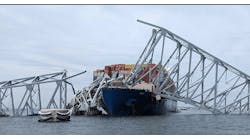Just when companies thought it was finally safe to make some long-delayed capital investments, politicians once again prove why they're among the most distrusted groups of professionals. An article in The Wall Street Journal this week said that while Democrats and Republicans debate how this country will meet its debts—or WHETHER it will—big companies are holding back on making any kind of major expenditures or hiring decisions.
“Companies from Ford Motor Co. to Eaton Corp. stressed the importance of ample liquidity, in view of current uncertainties in the market—from the U.S. debt impasse to troubled European economies,” the article reported.
Of course our stalwart leaders in Washington only want what's best for us taxpayers. They're trying to be more judicious about how they'll invest our money. On the defense side, I'm sure they've learned by their mistakes—like letting some of that $2.16 billion transportation contract in Afghanistan fund the Taliban. That will never happen again. Trust them.
The same day that gloomy WSJ article came out, PricewaterhouseCoopers released the latest edition of its PwC US Manufacturing Barometer. After reading it I wasn't sure the authors of this report or the executives who took part in the company's survey had the debt debate on their radar screens at all. At least it wasn't mentioned in the relatively rosy assessment this report conveyed.
“A vast majority of U.S. industrial manufacturers expect positive own-company revenue growth for 2011 and the next 12 months,” the report stated. “While several key factors including higher costs of raw materials and commodities, oil and energy prices, higher costs of services worldwide and the economic impact of Japan's earthquake and tsunami have contributed to the uncertainty about the world economy over the past 12 months, U.S.-based industrial manufacturers continued to grow international sales in the second quarter of 2011 and are projecting continued strength for overseas revenues.”
Then the report quoted Barry Misthal, U.S. industrial manufacturing leader for PwC, and his assessment was the exact opposite of what was conveyed in the WSJ report:
“U.S. industrial manufacturers aren't as concerned about demand over the next 12 months as in past quarters,” he said. “Furthermore, they are planning major new investments to introduce new products and services, expand their geographic reach and undertake business acquisitions to bolster growth.”
How could there be such a wide gap between these two outlooks? Maybe it's because PwC's surveys were conducted from April 7 through July 14th, and the debt ceiling crisis had yet to get everyone's attention. I'd like to think it's because some leading companies are taking the Washington Follies off their viewing schedule entirely and focusing instead on a regimen of self reliance. Something else PwC's Misthal said supports this:
“With concerns that the U.S economy may have stalled in the second quarter of this year and a number of barriers being cited that have the potential to limit growth in 2011, industrial manufacturers are looking to the mergers and acquisitions market to fuel growth. The right deals can not only add scale but build efficiencies and help businesses gain access to new markets.”
I like the way he's thinking. Makes me feel cautiously optimistic all over.


